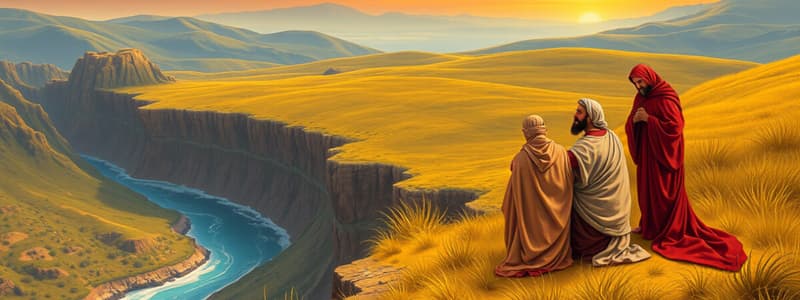Podcast
Questions and Answers
What is the first stage of the Apostasy Cycle outlined in the Book of Judges?
What is the first stage of the Apostasy Cycle outlined in the Book of Judges?
- Deliverance
- Oppression
- Repentance
- Sin (correct)
Which judge is known for defeating the Midianites with a small army?
Which judge is known for defeating the Midianites with a small army?
- Jephthah
- Gideon (correct)
- Ehud
- Deborah
What significant challenge did the Israelites face during the period of the Judges?
What significant challenge did the Israelites face during the period of the Judges?
- Conquest of foreign lands
- Division into city-states
- Centralized government establishment
- Surrounding hostile nations (correct)
Which of the following judges made a rash vow that resulted in the sacrifice of his daughter?
Which of the following judges made a rash vow that resulted in the sacrifice of his daughter?
What moral lesson emphasizes the consequences of the Israelites' unfaithfulness?
What moral lesson emphasizes the consequences of the Israelites' unfaithfulness?
Who was the only female judge in the Book of Judges?
Who was the only female judge in the Book of Judges?
What characterized the tribal structure of Israel during the time of the Judges?
What characterized the tribal structure of Israel during the time of the Judges?
Which judge is known for having a significant struggle with personal failures despite his strength?
Which judge is known for having a significant struggle with personal failures despite his strength?
Flashcards are hidden until you start studying
Study Notes
The Book of Judges
Cycle of Apostasy
- Apostasy Cycle: A recurring pattern throughout the book, including four stages:
- Sin: Israelites turn away from God and worship idols.
- Oppression: God allows foreign nations to conquer and oppress Israel.
- Repentance: Israelites cry out to God for help.
- Deliverance: God raises a judge to rescue them, restoring peace.
- Repetition: This cycle emphasizes the Israelites' recurring disobedience and God's mercy.
Major Judges
- Othniel: First judge, delivered Israel from Cushan-Rishathaim.
- Ehud: Left-handed judge who assassinated Eglon, king of Moab.
- Deborah: Only female judge, led Israel alongside Barak to defeat Sisera.
- Gideon: Defeated Midianites with a small army; tested God with the fleece.
- Jephthah: Made a rash vow leading to the sacrifice of his daughter; fought against Ammon.
- Samson: Known for his strength; fought the Philistines; struggled with personal failures.
Historical Context
- Period: Takes place after Joshua’s conquest of Canaan and before Israel's monarchy.
- Tribal Confederation: Israel consisted of tribes without a centralized government.
- Cultural Influence: Israel faced the challenge of maintaining identity amidst Canaanite influence and idol worship.
- Geopolitical Environment: Israel was surrounded by hostile nations, leading to cycles of war and oppression.
Israelite Tribes
- Tribal Structure: Israel comprised 12 tribes, each with unique territories and identities.
- Judges' Jurisdiction: Judges often arose from specific tribes but acted for the collective nation.
- Inter-tribal Relations: Conflicts and alliances among tribes were common; e.g., the story of Gibeah and the Benjamites.
Moral Lessons
- Consequences of Sin: Apostasy leads to suffering; emphasizes the need for faithfulness to God.
- Leadership: Judges exemplify various qualities of leadership—strength, wisdom, and failure.
- Divine Sovereignty: God’s ability to deliver despite Israel's unfaithfulness showcases His mercy and sovereignty.
- Community Responsibility: The Israelites’ collective failure and deliverance highlight the importance of community in faith.
Cycle of Apostasy
- Apostasy Cycle: A repeating pattern in the narrative consisting of sin, oppression, repentance, and deliverance.
- Sin: Israelites' rebellion against God, leading to idol worship.
- Oppression: God allows foreign nations to dominate and oppress the Israelites as a consequence.
- Repentance: Israelites seek God’s help after suffering oppression.
- Deliverance: God sends judges to save Israel and restore peace.
- Repetitive Nature: Highlights the Israelites' disobedience and God's continual mercy.
Major Judges
- Othniel: The first judge, who liberated Israel from the king of Mesopotamia, Cushan-Rishathaim.
- Ehud: Noted for his left-handedness; assassinated Eglon, the Moabite king, to free Israel.
- Deborah: The only female judge who coordinated Israel’s forces with Barak to defeat the Canaanite general Sisera.
- Gideon: Successfully led the defeat of the Midianites with a reduced army; tested God through the fleece for confirmation.
- Jephthah: Made a tragic vow leading to the sacrifice of his daughter; emerged as a leader against the Ammonites.
- Samson: Renowned for his immense strength; faced and fought the Philistines but faced personal failures due to his weaknesses.
Historical Context
- Timeframe: Occurs after the conquest of Canaan by Joshua but prior to the establishment of a monarchy in Israel.
- Political Structure: Israel functioned as a tribal confederation without a centralized governance system.
- Cultural Challenges: Israelites struggled to maintain their identity against Canaanite cultural and idol worship influences.
- Geopolitical Struggles: Israel existed amid hostile neighboring nations, contributing to ongoing cycles of oppression and warfare.
Israelite Tribes
- Tribal Composition: Israel consisted of 12 distinct tribes, each with specific territories and identities.
- Judges’ Role: Judges arose from various tribes but acted with authority for the entire nation.
- Inter-Tribal Dynamics: Conflicts, such as the incident at Gibeah involving the Benjamites, illustrate the complexity of tribal relationships.
Moral Lessons
- Suffering from Sin: Highlights the consequences of apostasy, emphasizing the critical need for faithfulness to God.
- Leadership Qualities: Judges exemplify different leadership traits, including strength, wisdom, and moments of failure.
- God's Sovereignty: Demonstrates God’s ability to rescue Israel despite ongoing unfaithfulness, showcasing divine mercy.
- Community Impact: Stresses the importance of collective responsibility within the community for faith and morality.
Studying That Suits You
Use AI to generate personalized quizzes and flashcards to suit your learning preferences.




